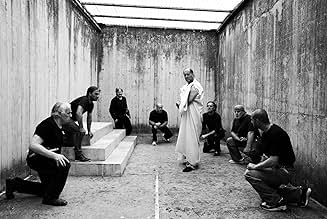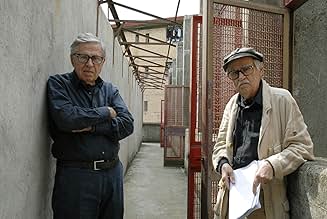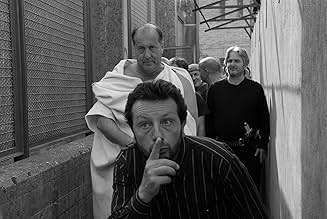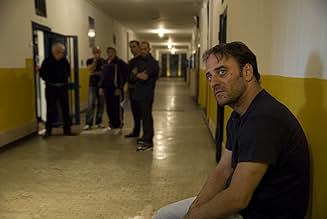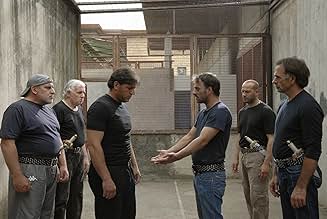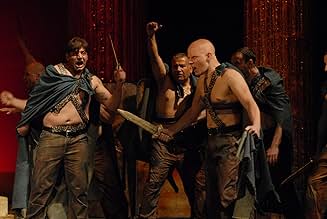AVALIAÇÃO DA IMDb
7,3/10
6,9 mil
SUA AVALIAÇÃO
Adicionar um enredo no seu idiomaInmates at a high-security prison in Rome prepare for a public performance of Shakespeare's "Julius Caesar."Inmates at a high-security prison in Rome prepare for a public performance of Shakespeare's "Julius Caesar."Inmates at a high-security prison in Rome prepare for a public performance of Shakespeare's "Julius Caesar."
- Direção
- Roteiristas
- Artistas
- Prêmios
- 16 vitórias e 21 indicações no total
- Direção
- Roteiristas
- Elenco e equipe completos
- Produção, bilheteria e muito mais no IMDbPro
Avaliações em destaque
I saw the world premiere of this movie at the Berlinale, where it won the golden bear last night. The movie is not bad, but also not special. The basic idea -real prison inmates play Shakespeares "Julius Caerar"- makes the movie interesting and the impressive acting makes you often forget, what fate those men face and what brought them to prison (murder, mafia-crimes etc). But since you know all that from the promotion already, the movie sometimes just leads up to watching an old Shakespeare-play, which we also already know. Just some philosophic aspects (at the end) and the idea of not showing the actual play, but the criminals only practicing it most of the time, is very entertaining.
It's rather discardable. The directing brothers were frustrated as they tried to create something as interesting as Kaos, Fiorile or Luisa Sanfelice. If this is up to the Golden Berlinese Bear, it's a sign of how low the level of current productions is. This is meta-theatre, set in Rebibbia, a high-security prison in Rome. The performers are real life convicts. "Cesar must die addresses the links between drama and reality , but working with amateurs didn't help. The film may be useful as kinda sociological propaganda, but it never qualifies as 'Cinéma vérité,' the meta-style of fiction-documentation filmmaking developed by Edgar Morin and Jean Rouch, inspired by the former theories about Kino-Pravda. I do call it a kind of Reality Show, though. Aren't Inmates Survivors & Big Brothers who are Keeping Up with the Roman Kardashians after all? ;-)
Unable to snap up a ticket for this during Berlinale Film Festival (where it also won the grand prize), I've been itching to see Caesar Must Die (Cesare deve morire) for quite some time now. The latest from veteran Italian duo, Paolo and Vittorio Taviani (Padre Padrone, Kaos), it's a documentary-fiction hybrid observing the rehearsals and final performance of William Shakespeare's Roman masterpiece 'Julius Caesar'. What makes this movie noteworthy is it's idiosyncratic formalities: the play is being performed from Rome's high security Rebibbia Prison, and the players are it's incarcerated residents: an ensemble cast of murderers, drug dealers and thieves.
The brothers waste no time with needless exposition on the inmates' backstories or crimes. Instead, the pair focus, with brutal proximity, how these criminals connect with the words of "The Bard". Aside from the final, veracious performance, it's all shot in stylised black and white, as we see the production being set up, the rehearsals in the prison courtyard, and the delicate moments these wrongdoers spend behind cell bars. As is often the case with the Taviani's back-catalogue, there's moments filmed in tender close-ups; loading objects such as an empty chair or a wooden sword an implausible subtext.
That meta-narrative carries over to the inmates themselves, and ends up confusing us. Not only are they performers in the Shakespearean sense, it quickly becomes clear that they are being presented as poetical cyphers of their real life criminal selves. It's a shameful attempt at allegory – expressing how the elder words of Shakespeare relate to contemporary penal society, and in doing so removes any sense of empathy we would have otherwise had for the inmates.
Although the "play-within-a-film" gimmick is a good one, it's hardly original (Charlie Kaufman's Synecdoche, New York and Canadian filmmaker John Greyson's Lillies are both really worth a look). It's also not the best part of Caesar Must Die. With such astounding performances and beautiful adaptation of Shakespeare's words, one wishes that the Tatvianis abandoned the ostentatious stunts and luscious monochrome display, and instead focused plainly on documenting these ostracised people. An extraordinary, grotesque bunch, who find happiness, solidarity and hope in creative expression.
Read more reviews at www.366movies.com
The brothers waste no time with needless exposition on the inmates' backstories or crimes. Instead, the pair focus, with brutal proximity, how these criminals connect with the words of "The Bard". Aside from the final, veracious performance, it's all shot in stylised black and white, as we see the production being set up, the rehearsals in the prison courtyard, and the delicate moments these wrongdoers spend behind cell bars. As is often the case with the Taviani's back-catalogue, there's moments filmed in tender close-ups; loading objects such as an empty chair or a wooden sword an implausible subtext.
That meta-narrative carries over to the inmates themselves, and ends up confusing us. Not only are they performers in the Shakespearean sense, it quickly becomes clear that they are being presented as poetical cyphers of their real life criminal selves. It's a shameful attempt at allegory – expressing how the elder words of Shakespeare relate to contemporary penal society, and in doing so removes any sense of empathy we would have otherwise had for the inmates.
Although the "play-within-a-film" gimmick is a good one, it's hardly original (Charlie Kaufman's Synecdoche, New York and Canadian filmmaker John Greyson's Lillies are both really worth a look). It's also not the best part of Caesar Must Die. With such astounding performances and beautiful adaptation of Shakespeare's words, one wishes that the Tatvianis abandoned the ostentatious stunts and luscious monochrome display, and instead focused plainly on documenting these ostracised people. An extraordinary, grotesque bunch, who find happiness, solidarity and hope in creative expression.
Read more reviews at www.366movies.com
A week has passed since I watched "Cesare deve morire" and I am still trying to decipher the multiple layers on which this film has worked in my mind. The brothers Taviani have directed a masterpiece of 76' which however is so dense in content that the time is waxing inside one's own memory.
The Tavianis are documenting the mis-en-scene of a Shakespeare piece inside a prison. Probably the most impressive element of "Cesare deve morire" is the performances of the inmate actors. The fact that the film is shot as a documentary in its natural setting spreads the film in two layers which are seamlessly weaved on each other. On the first level we see the prisoners who are passionately rehearsing the lines of their characters and on the second level we stand on front of Cesar, Brutus and Antonius discussing in the alleys of Rome. As in the case of Bergman, the brothers Taviani are very successfully studying the relationship between theater and cinema.
This prison setting is extremely symbolic and renders the actor performances utterly intense. It feels as if the prisoners, lacking their physical freedom, are getting deep into the skin of those new personas seeking the experiences which prison has deprived them of. The performances are so convincing that one has to contemplate on the nature of human destiny. Could it be that one's social condition or even coincidences could make the same persons capable of the best and of the worst? Moreover, the film leads to an unavoidable rumination of the concept of freedom in all its forms.
A stark black and white photography pronounces the prison architecture and recreates ancient Rome in its bare corridors. The photography is perfectly self-standing and it would be of great artistic value even in the absence of a plot. The black and white may emphasize the lack of freedom of the inmates but also allows the spectator to ignore redundant information and to concentrate on the performances of the actors. It is remarkable how architectural beauty arises even in a prison. The common spaces are illustrated exceptionally well and after a while one feels lost in a limbo between the prison and Rome.
Finally, although the audience reaches catharsis after the end of Shakespeare's narration the narration of brothers Taviani remains unresolved into ones psyche. I personally believe that "Cesare deve morire" is one of those rare cinematic experiences that are capable to shake away well entrenched beliefs. That alone would make the film worth seeing. Gladly, those 76' are so much more.
The Tavianis are documenting the mis-en-scene of a Shakespeare piece inside a prison. Probably the most impressive element of "Cesare deve morire" is the performances of the inmate actors. The fact that the film is shot as a documentary in its natural setting spreads the film in two layers which are seamlessly weaved on each other. On the first level we see the prisoners who are passionately rehearsing the lines of their characters and on the second level we stand on front of Cesar, Brutus and Antonius discussing in the alleys of Rome. As in the case of Bergman, the brothers Taviani are very successfully studying the relationship between theater and cinema.
This prison setting is extremely symbolic and renders the actor performances utterly intense. It feels as if the prisoners, lacking their physical freedom, are getting deep into the skin of those new personas seeking the experiences which prison has deprived them of. The performances are so convincing that one has to contemplate on the nature of human destiny. Could it be that one's social condition or even coincidences could make the same persons capable of the best and of the worst? Moreover, the film leads to an unavoidable rumination of the concept of freedom in all its forms.
A stark black and white photography pronounces the prison architecture and recreates ancient Rome in its bare corridors. The photography is perfectly self-standing and it would be of great artistic value even in the absence of a plot. The black and white may emphasize the lack of freedom of the inmates but also allows the spectator to ignore redundant information and to concentrate on the performances of the actors. It is remarkable how architectural beauty arises even in a prison. The common spaces are illustrated exceptionally well and after a while one feels lost in a limbo between the prison and Rome.
Finally, although the audience reaches catharsis after the end of Shakespeare's narration the narration of brothers Taviani remains unresolved into ones psyche. I personally believe that "Cesare deve morire" is one of those rare cinematic experiences that are capable to shake away well entrenched beliefs. That alone would make the film worth seeing. Gladly, those 76' are so much more.
10ibarradj
I saw this at the Palm Springs Film Festival and was blown away! As soon as the movie began, I could tell it was a movie that I should pay attention.
The plot is a performance of Shakespeare's Julius Caesar by a group of real-life prisoners in an Italian prison. I loved how the prisoners could relate to the play by seeing the parallels in their own lives--the power lust, deceit and betrayal. The more the prisoners understood the play, the more they became immersed in their roles.
There have been many attempts to make Shakespeare palatable to the modern audience. This was my favorite iteration because it showed the actors trying to understand it, just as an audience might try to find the relevance. As a high school student, I found Shakespeare and Roman History boring. It wasn't until I hit my 40s did I realize this history was more violent than the Sopranos.
I don't know if this movie has ever been widely released. I highly recommend seeing it if it ever comes to your town.
The plot is a performance of Shakespeare's Julius Caesar by a group of real-life prisoners in an Italian prison. I loved how the prisoners could relate to the play by seeing the parallels in their own lives--the power lust, deceit and betrayal. The more the prisoners understood the play, the more they became immersed in their roles.
There have been many attempts to make Shakespeare palatable to the modern audience. This was my favorite iteration because it showed the actors trying to understand it, just as an audience might try to find the relevance. As a high school student, I found Shakespeare and Roman History boring. It wasn't until I hit my 40s did I realize this history was more violent than the Sopranos.
I don't know if this movie has ever been widely released. I highly recommend seeing it if it ever comes to your town.
Você sabia?
- CuriosidadesPaolo and Vittorio Taviani heard about the prisoners acting program and contacted Fabio Cavalli with the idea of doing Shakespeare's play and shot the whole experience.
- ConexõesFeatured in Film '72: Episode dated 27 February 2013 (2013)
Principais escolhas
Faça login para avaliar e ver a lista de recomendações personalizadas
- How long is Caesar Must Die?Fornecido pela Alexa
Detalhes
- Data de lançamento
- País de origem
- Centrais de atendimento oficiais
- Idioma
- Também conhecido como
- Caesar Must Die
- Locações de filme
- Empresas de produção
- Consulte mais créditos da empresa na IMDbPro
Bilheteria
- Faturamento bruto nos EUA e Canadá
- US$ 76.908
- Faturamento bruto mundial
- US$ 1.567.339
- Tempo de duração
- 1 h 17 min(77 min)
- Cor
- Mixagem de som
- Proporção
- 1.85 : 1
Contribua para esta página
Sugerir uma alteração ou adicionar conteúdo ausente


